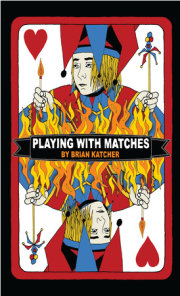chapter one
I’m not sure what I loved most about being on the track team. Maybe it was the crippling shin splints. Or constantly feeling like I’d just smoked three packs of cigarettes. Maybe it was the empty stands at every meet, or the way the results got buried in the local sports section.
The football field was by far the best feature of Boyer, Missouri. My hometown, which barely boasted two thousand people, pumped nearly every tax dollar they could into maintaining the facility. The city of Boyer was little more than a half-dozen trailer parks, an electronics factory, and five churches, but the football field was always pristine. The maintenance staff mowed the grass twice a week and watered it every day in the summer. The bleachers gleamed, the locker rooms sparkled, and the scoreboard towered like some great pagan idol. The crumbling structure of Boyer High School stood across the parking lot, almost as an afterthought.
Us track poseurs were permitted to run the perimeter of the sacred field, but only when the football heroes had no use for it. During the fall we had to run laps in the parking lot while the Boyer Bears practiced. One time we were run off by the marching band, which gives you an idea of where we stood in the school food chain.
It was mid-November. My friend Jack Seversen and I had managed to squeeze in some after-school running, trying to stay in shape for the winter. The cold wind chilled my sweat-soaked body, making me shiver and swelter at the same time. Exhausted and thirsty, I walked a final lap to avoid muscle cramps, then limped toward the watercooler.
“You suck, Logan!” shouted Jack, jogging up behind me. Even though he’d run as much as I had, he was still vibrating with raw energy. Thin as a whip and gangly, Jack reminded me of a broken fan belt, wildly flailing in no particular direction. Track wasn’t a sport for him; it was merely an excuse to move.
“Hey, check it out.” He jabbed his bony, spastic hand toward the football field. The Boyer cheerleaders were wrapping up their practice. I’d heard that in bigger towns, only the pretty, graceful girls made the squads. In Boyer, with a student body of about two hundred, the only membership requirement was a majority of intact limbs and the ability to bend at the waist.
Jack and I reached the water table. I chugged a couple of cups, while my friend, in spite of the low temperature, dumped his over his head. He shook like a wet dog. Eventually, he managed to focus on me. Even then, his protruding brown eyes spun in their orbits like a weather vane in March. Jack had that intense mania common in serial killers and car salesmen.
“You should go talk to Tanya. She likes you.”
Without meaning to, I glanced over at the squad. I could just make out Tanya’s form as she did jumping jacks with the others.
“It’s a wonder she doesn’t knock herself out,” I muttered. In elementary school (in Boyer, you knew all your classmates since kindergarten), Tanya had been the fat girl. Then, in eighth grade, most of her body mass had migrated into her chest. She wasn’t exactly bikini material, but she did have a couple of good points.
“C’mon, Logan. Don’t tell me you wouldn’t like to press your face into her chest and make motorboat noises.”
I stifled a laugh. “Piss off, Jack.”
I walked over to the bleachers and grabbed my bag from next to my old bike. Jack followed me, almost uncomfortably closely, and then suddenly grabbed my shoulder.
“Dude, it’s time to get back in the game.”
I yanked away. “Drop it, okay?”
He didn’t drop it. “You’re a senior, Logan. In May, we leave this place forever. Don’t spend your last semester moping about your ex-girlfriend.”
I stormed into the gymnasium, a blocky building that we shared with the middle school next door. I made sure I was alone in the locker room. Then I drove my fist into a metal door. The sound echoed through the empty room. Pain radiated through my wrist and shoulder.
Jack thought he was being helpful. He thought Brenda had just been another girl. For the past month, he’d been trying to fix me up. To him, all I needed to do was make out with some random chick and I’d forget about how Brenda had dumped me.
To be quite honest, she never actually dumped me. It was her decision to sleep with another guy that had put the strain on our three-year relationship.
I quickly stripped down and hopped in the shower. As the stall steamed up, I thought about Brenda. The homecoming dance in early October. I’d sold my baseball card collection just to pay for her corsage and had to drive to nearby Columbia to rent my tuxedo.
I paused, midlather, remembering that night. My tux hadn’t fit exactly right; my arms were too long and my chest too broad. With my advanced hairline and jutting forehead, I’d thought I resembled a shaved ape. Even with my mom’s help, I looked like some Mafia don’s bodyguard; a muscle-bound lummox, washed and dressed for a night out with sophisticated people.
Brenda had told me I looked suave, like a James Bond supervillain. She’d said I had the face of an angel and the body of a god. I found out later she didn’t always tell the truth.
Brenda had been dolled up like someone you’d see on a movie poster. Her long black hair had been styled at the local salon. She’d worn blush on her high cheekbones and had left her glasses at home, even though that meant she was almost blind. Her dark blue dress had exposed her smooth shoulders. As I strapped the corsage onto her delicate wrist, I’d felt a sting of electricity shoot through my arm, down my legs, and out the heels of my rented shoes. Of the dozens and dozens of guys in Boyer, Brenda had chosen me. If I’d won a million dollars in the lottery the next day, I’d have called the money the other good thing that happened that week.
After the dance, I’d driven her in my mom’s car to the empty field out by the water tower. I don’t think I’d ever been that nervous. I wanted everything to be perfect. I had a blanket in the trunk and her favorite songs in the CD player. I had driven all the way out to Moberly to buy condoms.
We’d kissed for about two minutes. Then Brenda had asked me to drive her home. I could still remember the little speech she gave me as we pulled into her driveway at eleven p.m.
Logan, I’m just not ready for that. Could we wait a little longer? Please? Think about how special it will be.
As I turned off the shower and wrapped a towel tightly around my waist, I wondered how special it had been for Brenda. I just wished I could have been there.
Copyright © 2009 by Brian Katcher. All rights reserved. No part of this excerpt may be reproduced or reprinted without permission in writing from the publisher.







